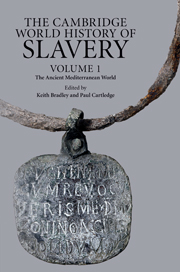Book contents
- Frontmatter
- Contents
- Series editors' introduction
- List of figures
- Acknowledgements
- Introduction
- 1 Slavery in the ancient Near East
- 2 Slaves in Greek literary culture
- 3 Classical Athens
- 4 The Helots: a contemporary review
- 5 Slavery and economy in the Greek world
- 6 The slave supply in classical Greece
- 7 Slavery and the Greek family
- 8 Resistance among chattel slaves in the classical Greek world
- 9 Archaeology and Greek slavery
- 10 Slavery in the Hellenistic world
- 11 Slavery and Roman literary culture
- 12 Slavery in the Roman Republic
- 13 Slavery Under the Principate
- 14 The Roman slave supply
- 15 Slave labour and Roman society
- 16 Slavery and the Roman family
- 17 Resisting slavery at Rome
- 18 Slavery and Roman material culture
- 19 Slavery and Roman law
- 20 Slavery and the Jews
- 21 Slavery and the rise of Christianity
- 22 Slavery in the late Roman world
- Bibliography
- General index
- Index of ancient passages cited
- Index of inscriptions and papyri
- Index of Jewish and Christian Literature Cited
4 - The Helots: a contemporary review
Published online by Cambridge University Press: 28 September 2011
- Frontmatter
- Contents
- Series editors' introduction
- List of figures
- Acknowledgements
- Introduction
- 1 Slavery in the ancient Near East
- 2 Slaves in Greek literary culture
- 3 Classical Athens
- 4 The Helots: a contemporary review
- 5 Slavery and economy in the Greek world
- 6 The slave supply in classical Greece
- 7 Slavery and the Greek family
- 8 Resistance among chattel slaves in the classical Greek world
- 9 Archaeology and Greek slavery
- 10 Slavery in the Hellenistic world
- 11 Slavery and Roman literary culture
- 12 Slavery in the Roman Republic
- 13 Slavery Under the Principate
- 14 The Roman slave supply
- 15 Slave labour and Roman society
- 16 Slavery and the Roman family
- 17 Resisting slavery at Rome
- 18 Slavery and Roman material culture
- 19 Slavery and Roman law
- 20 Slavery and the Jews
- 21 Slavery and the rise of Christianity
- 22 Slavery in the late Roman world
- Bibliography
- General index
- Index of ancient passages cited
- Index of inscriptions and papyri
- Index of Jewish and Christian Literature Cited
Summary
INTRODUCTION
‘Helot’ has entered the contemporary English lexicon to refer to a member of a singularly oppressed or exploited underclass. This is a tribute to the enduring power of the Spartan myth or mirage. ‘Helot’ also occasioned an ancient Greek verb with general reference, heiloteuein (Isocrates 4.131), meaning to be reduced to the status of Helotage, which is a tribute of a different sort to the singularity of the institution in antiquity. Helotage, a modern English term of art for what the Spartans would have called douleia (see below), lasted throughout the rise, climax and decline of the Spartan polity – right up to the Roman conquest in the second or first century bc, as noted by the Augustan-period Greek geographer and cultural historian Strabo (8.5.4). Sparta, or Lacedaemon as the polis was officially known, was the largest Greek state in extent of territory (c. 8,400 sq. km.). The largest by far in fact: more than double the size of the next (Syracuse) and over three times as large as the most populous (Athens) of the 1,000 or so Greek citizen-states.
Yet although Sparta had a smaller overall population than Athens, it had the highest density of slave to free, followed, not by Athens, but by the island-state of Chios (Thucydides 8.40.2). As Plato, or the pseudo-Platonic author of the First Alcibiades Socratic dialogue (I.122d), observed in the fourth century bc, ‘no one could doubt that their land in Laconia and Messenia is superior to our [Athenian] land, both in extent and quality, not to mention the number of their slaves and especially the Helots’.
- Type
- Chapter
- Information
- The Cambridge World History of Slavery , pp. 74 - 90Publisher: Cambridge University PressPrint publication year: 2011
- 5
- Cited by



